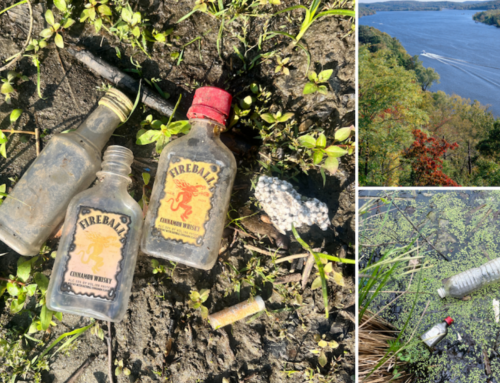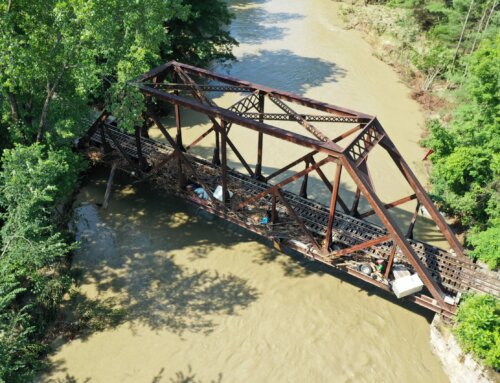Connecticut River Conservancy Testimony in OPPOSITION of HB 6486 An Act Concerning Extended Producer Responsibility for Tires
To: Honored Co-Chairs, Sen. Lopes and Rep. Gresko, and distinguished Members of the Environment Committee
I am writing on behalf of the Connecticut River Conservancy; we are an environmental nonprofit dedicated to protecting the entire Connecticut River valley through initiatives that support clean waters, healthy habitats and thriving communities. I am writing in opposition of HB 6486 as it is currently written as it does not reflect a true Extended Producer Responsibility (EPR) framework for tires, and to urge this committee to adopt language for a true EPR for tires framework as seen in 2022’s HB 5139, which will not only protect our environment from toxic pollutants but will also reduce burdensome costs for municipalities and taxpayers.
The tire crisis is twofold: illegal tire dumping plagues our public lands, and the primary scrap tire end use, burning tires for fuel, is not sustainable.
Connecticut drivers produce roughly 3.5 million scrap tires per year and each year, volunteers in our Source to Sea cleanup take to their rivers to remove many of these illegally dumped tires; to-date, volunteers have retrieved over 13,900 tires from the Connecticut River Watershed. In recent years, volunteers have pulled hundreds and, in some cases, thousands of tires out of rivers during this event, signaling an ongoing problem with the management of scrap tires. While commendable progress has been made to reduce illegal tire stockpiling, this should not be conflated with illegal tire dumping; to assert that illegal tire dumping is no longer an issue, is to deny the reality of volunteers and public servants doing the work on the ground.
Scrap tires have profound costs for the environment. Tires dumped onto our public lands and into our waterways leach toxic materials into soil and water; they create fire hazards and attract vermin and mosquitoes, which pose human health threats. In a 2020 study of the cause of acute mortality of adult coho salmon, scientists identified tire-derived chemicals as the sole cause of mortality. For tires that do make their way through the disposal system, most of these will be trucked to Maine to be burned as tire derived fuel (TDF) at cement kilns or pulp mills. The language proposed in HB 6486 states that businesses that use scrap tires to “recover energy or produce energy” – in other words, TDF- are considered “recyclers.” This is misleading and disingenuous. We urge the committee to prohibit TDF as a form of recycling – as seen in HB 5139 which states “‘Recycling’ does not include the use of incineration for energy recovery.”
Right now, municipalities and state agencies must pay the disposal costs of illegally dumped tires, an unjust burden to towns and taxpayers.
Not only is our environment bearing the costs of the scrap tire crisis, but these costs are also forced on taxpayers via municipalities and state agencies that must pay for the retrieval and disposal of illegally dumped tires. In surveys of municipalities in the Connecticut Coalition for Sustainable Materials Management (CCSMM) group, municipalities responded that:
- Tires are the number one item for which municipalities want to establish EPR.
- 83% of participants supported EPR for tires, while 15% said they needed more information or were not sure.
- In 2014, the state of Connecticut paid $16,000 for illegal tire dumping in just six months, while in cities such as New Haven, officials received alerts of over 70 instances of illegal tire dumping, also in just six months and mostly along waterways and ravines.
- The City of Bridgeport’s annual operating budget for 2020-2021 reads, “Illegal tire dumping is a particularly expensive issue for Public Facilities, with volumes of tires that must be generated by commercial operations…”
EPR will eliminate illegal tire dumping and undue costs for municipalities; a state-run or manifest program will not.
EPR speaks to the elephant in the room – producers must accept responsibility for the costs their products incur on the environment and the people of Connecticut. Those with the only say in how a product is made should also be responsible for how it is discarded.
EPR will relieve volunteers and municipalities of the exhaustive costs of tire disposal by internalizing existing, external costs – costs that are simply not accounted for in the sale price of the product. Already, EPR programs have proven successful in Connecticut. Since 2011, the electronics EPR model has recycled over 137 million pounds of unwanted electronics, created 86 new recycling jobs and saved over $6 million dollars for municipalities.
State-run or manifest programs do not address this issue of external costs and do nothing to curb illegal tire dumping. These are costly programs that come at the expense of taxpayers and, in states with tire disposal programs, illegal tire dumping persists with the same environmental and economic injustices of the current system. A state-run program would create far fewer jobs and as seen in existing state-run programs, does not establish incentives to recycle tires nor does it effectively enforce compliance with hauler licensing. The proposed language in HB 6486 outlines a state run “Scrap Tire Recycling Development Fund.” A true EPR for tires framework hold producers responsible – we support the creation of a tire stewardship organization made up of producers who are responsible for the end of life management for tires. Again, we write in opposition to HB 6486 to protect the health of our environment and eliminate unfair costs for taxpayers and municipalities across Connecticut but urge the committee to prohibit TDF as a form of recycling and to adopt a true EPR for tires model as put forward in 2022’s HB 5139.
Thank you for your consideration. I may be reached at rdrozdenko@ctriver.org or 860-929-8021.
Rhea Drozdenko (she/her/hers)
River Steward







